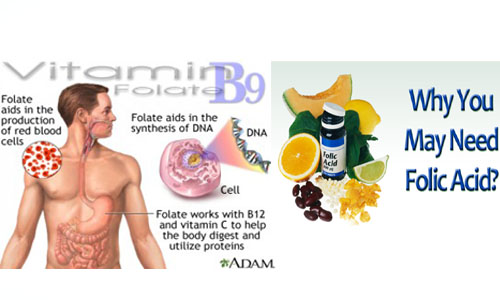Difference between folate and folic acid
There are certain minerals and vitamins which are very important for the proper functioning of the body. These substances are usually part of our diet but if by any chance the body does not get the right supply of these substances then it can develop a condition known as ‘deficiency’ where the body is deficient of one or more significant substances. One very important such substance that the body needs is folate or folic acid. The two are very similar and most people assume that they are exactly the same. This is not always the case but it must be noted that many a times the two can be and indeed are the same.
Folate or folic acid is a type of vitamin B. Moreover, it is also referred to as vitamin M, vitamin B9, Vitamin Bc, pteroyl-L-glutamate as well as pteroyl-L-glutamic acid. The term folate is used for folic acid for a special case. In the food supplement industry, the term folate is used to denote a difference with folic acid. In pure chemistry, the term folate is used as a reference to the ion whereas folic acid is used to refer to the protonated ion. Both of these co-exist in water. Apart from this, it is universally accepted and even stated by The International Union of Pure and Applied Chemistry that folic acid and folate are synonyms.
Moving on, in the food supplement industry, the word folate is particularly used to refer to the naturally occurring form of folic acid. To further clarify the difference between the two, it can be said that folate is a general term or an umbrella term that includes a group of b vitamins that are water soluble. It is also known as B9. Folic acid, however, is used to refer particularly to the oxidized synthetic compound which is used in dietary supplements as well as food fortification. The many known tetrahydrofolate derivatives naturally found in food cannot be called as folic acid; they come under folate.
The way in which the folate and folic acid are metabolized in the body also varies. Natural folates are usually metabolized to THF in the mucosa which is in the small intestine. On the other hand, folic acid initially undergoes reduction and consequently methylation in the liver. Dihydrofolate reductase enzyme is needed to facilitate its conversion to the THF form. The activity of this enzyme in the body is quite low and combined with the comparatively high intake of folic acid, the result may be unnatural levels of folic acid that remain unmetabolized which may then enter systematic circulation.
Let us also illustrate the difference between the two by some examples. Folate, which is a naturally occurring form of the b-vitamin, is found in lentils, spinach, garbanzo beans etc. The mentioned foods are very good sources of dietary folate. Folic acid, however, is the synthetic form of the same vitamin and can be added synthetically to various foods, especially those that are made particularly for patients that have a folic acid deficiency.
In the body, the two work or effect the body in the same way. However, there is one difference. The synthetic form of the vitamin, namely folic acid is made to be better absorbed by the body than its natural counterpart, folate. Moreover, due to better absorption, a lower quantity of folic acid is needed than folate for the same benefits. To be precise, 100 mcg of folate is more or less equivalent to 60 mcg of folic acid.
Summary
1. Folate or folic acid is a type of vitamin B, also referred to as vitamin M, vitamin B9, Vitamin Bc, pteroyl-L-glutamate as well as pteroyl-L-glutamic acid
2. In pure chemistry, the term folate is used as a reference to the ion whereas folic acid is used to refer to the protonated ion. Both of these co-exist in water
3. In the food supplement industry, the word folate is particularly used to refer to the naturally occurring form of folic acid; folic acid is made synthetically
4. Folate-a general term for a group of b vitamins that are water soluble; Folic acid, however, is used to refer particularly to the oxidized synthetic compound
5. Natural folates are metabolized to THF in the mucosa which is in the small intestine; folic acid initially undergoes reduction and consequently methylation in the liver
6. Folic acid is made to be better absorbed by the body than its natural counterpart, folate and is therefore needed in a lower quantity
- The difference between Royal icing and Buttercream icing - March 22, 2015
- Difference between stuffed and deep dish pizza - March 21, 2015
- Difference between Crane and Heron - March 20, 2015
Search DifferenceBetween.net :
1 Comment
Leave a Response
References :
[0]http://geneticgenie.org/wp-content/uploads/2013/02/19518-300x240.jpg
[1]http://www.blackwomenshealth.com/site_media/uploads/article_pictures/folicacid-slider.png


This article doesn’t talk about the pros & Cons of Folates and Folic Acid. It looks too technical for the common man like me who wants to know benefits and drawbacks, how to take it, and what to take along for better absorption, and so on.
Both versions might have specific benefits for body, apart from the common ones.